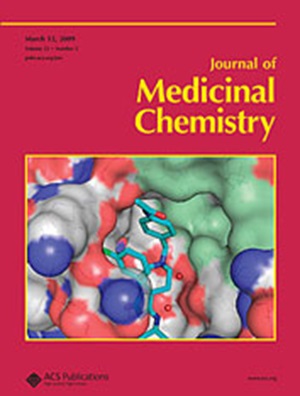ZJK-807: KRASG12D克服胰腺癌耐药的选择性PROTAC降解剂
IF 6.8
1区 医学
Q1 CHEMISTRY, MEDICINAL
引用次数: 0
摘要
由KRASG12D突变驱动的胰腺癌面临着KRAS不可药性和通过继发性突变(例如Q95/Y96)对MRTX1133等抑制剂获得性耐药的治疗挑战。在这里,我们报道了一种新的基于小脑(CRBN)的蛋白水解靶向嵌合体(PROTAC) ZJK-807,将KRASG12D抑制剂偶联到CRBN配体上。选择性降解KRASG12D(在AsPC-1细胞中DC50 = 79.5±5.4 nM),对野生型KRAS或其他突变体(G12C/S/V, G13D)影响最小,诱导突变特异性细胞毒性。关键的是,ZJK-807通过降解突变体KRASG12D和抑制MRTX1133失效的耐药细胞生长来克服继发性突变抗性。转录组学分析显示,ZJK-807抑制RAS/MAPK信号,并独特地调节TNF信号和真核核糖体的生物发生,表明其具有明显的机制优势。在体内,ZJK-807 (30 mg/kg,皮下)在AsPC-1异种移植物中具有47%的肿瘤生长抑制作用,并具有良好的药代动力学。本研究提出了一种基于crbn的PROTAC选择性靶向和降解耐药KRASG12D突变体,为kras驱动的恶性肿瘤建立了一种突破性的方法。本文章由计算机程序翻译,如有差异,请以英文原文为准。
ZJK-807: A Selective PROTAC Degrader of KRASG12D Overcoming Resistance in Pancreatic Cancer.
Pancreatic cancer driven by the KRASG12D mutation faces therapeutic challenges from KRAS undruggability and acquired resistance to inhibitors like MRTX1133 via secondary mutations (e.g., Q95/Y96). Here, we report ZJK-807, a novel cereblon (CRBN)-based proteolysis-targeting chimera (PROTAC), conjugating a KRASG12D inhibitor to a CRBN ligand. It selectively degrades KRASG12D (DC50 = 79.5 ± 5.4 nM in AsPC-1 cells) with minimal impact on wild-type KRAS or other mutants (G12C/S/V, G13D), inducing mutant-specific cytotoxicity. Critically, ZJK-807 overcomes secondary mutation resistance by degrading mutant KRASG12D and suppressing resistant cell growth where MRTX1133 fails. Transcriptomic analysis revealed that ZJK-807 suppresses RAS/MAPK signaling and uniquely modulates TNF signaling and eukaryotic ribosome biogenesis, suggesting distinct mechanistic advantages. In vivo, ZJK-807 (30 mg/kg, subcutaneous) achieved 47% tumor growth inhibition in AsPC-1 xenografts with favorable pharmacokinetics. This study presents a CRBN-based PROTAC to selectively target and degrade resistant KRASG12D mutants, establishing a groundbreaking approach for KRAS-driven malignancies.
求助全文
通过发布文献求助,成功后即可免费获取论文全文。
去求助
来源期刊

Journal of Medicinal Chemistry
医学-医药化学
CiteScore
4.00
自引率
11.00%
发文量
804
审稿时长
1.9 months
期刊介绍:
The Journal of Medicinal Chemistry is a prestigious biweekly peer-reviewed publication that focuses on the multifaceted field of medicinal chemistry. Since its inception in 1959 as the Journal of Medicinal and Pharmaceutical Chemistry, it has evolved to become a cornerstone in the dissemination of research findings related to the design, synthesis, and development of therapeutic agents.
The Journal of Medicinal Chemistry is recognized for its significant impact in the scientific community, as evidenced by its 2022 impact factor of 7.3. This metric reflects the journal's influence and the importance of its content in shaping the future of drug discovery and development. The journal serves as a vital resource for chemists, pharmacologists, and other researchers interested in the molecular mechanisms of drug action and the optimization of therapeutic compounds.
 求助内容:
求助内容: 应助结果提醒方式:
应助结果提醒方式:


